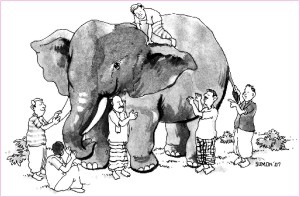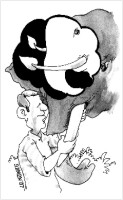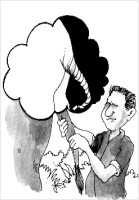| Story
From the Galpoghor Series:
Six Blind Men and an Elephant
 A long time ago in the valley of the Brahmaputra River in India there lived six men who were much inclined to boast of their wit and learning. Though they were no longer young and had all been blind since birth, they would compete with one another to see who could tell the tallest story. A long time ago in the valley of the Brahmaputra River in India there lived six men who were much inclined to boast of their wit and learning. Though they were no longer young and had all been blind since birth, they would compete with one another to see who could tell the tallest story.
Every evening, when the sun was setting behind the palms, and the air was full of wood smoke and spices, one of the old men would begin a new story. It might be of how he had spoken with Lord Krishna, whom he had met -- or so he said -- while walking in the forest. The man would tell how Lord Krishna appeared in a dazzling blue glow, playing a merry, enchanting tune upon his flute. And he would tell how Lord Krishna had granted him eternal wisdom above all other mortals.
 The second blind man might tell of the bulbul bird, who received his brilliant crimson breast one day when he espied the tiger fleeing from the porcupine. So funny was the scene that the bird had burst himself laughing and the blood had spilled all over his breast. The second blind man might tell of the bulbul bird, who received his brilliant crimson breast one day when he espied the tiger fleeing from the porcupine. So funny was the scene that the bird had burst himself laughing and the blood had spilled all over his breast.
Not to be outdone, the third blind man would cough and clack his tongue as if holding a conversation with a lizard on a mud hut wall. Having taken inspiration thus, he might tell of the times of good King Vikramaditya who had saved a Brahmin's child and wed a humble peasant girl.
After him the fourth, followed by the fifth and then the sixth would tell their stories, each more fantastic than the one before. So it continued, the blind men passing away the time in harmless boasting.
 One day, however, they fell to arguing. The object of their dispute was the elephant. Now, since each was blind, none had ever seen that mighty beast of whom so many tales are told. So, to satisfy their minds and settle the dispute, they decided to go and seek out an elephant. One day, however, they fell to arguing. The object of their dispute was the elephant. Now, since each was blind, none had ever seen that mighty beast of whom so many tales are told. So, to satisfy their minds and settle the dispute, they decided to go and seek out an elephant.
Having hired a young guide, Dookiram by name, they set out early one morning in single file along the forest track, each placing his hands on the back of the man in front. It was not long before they came to a forest clearing where a huge bull elephant, quite tame, was standing contemplating his menu for the day.
The six blind men became quite excited; at last they would satisfy their minds. Thus it was that the men took turns to investigate the elephant's shape and form.
The first blind man to approach the elephant came forward boldly but, sadly for him, stumbled over a log and fell sprawling against the beast's broad side.
'O my brothers,' he at once cried out, 'it is as sure as I am wise that this elephant is like a great mud wall baked hard in the sun.'
The second blind man was more cautious and when his turn came, he edged forward, hands outstretched, to feel the way. Since he had approached it from the front, his hands presently encountered two long, sharp objects that curved high above his head. It was the elephant's strong tusks.
'Now, my brothers,' the man exclaimed with a cry of dawning recognition, 'I can tell you what shape this elephant is -- he is exactly like a spear.'
The others smiled in disbelief.
Now it was the turn of the third blind man, who came to the object of their curiosity from the rear. Carefully, he stepped forward, his hands waving in the air before him until he touched the elephant's tail. Seizing it in both hands, he felt the strong bending twine and the coarse fibers on the tip.
'Why, dear brothers, do you not see -- this elephant is very much like a rope,' he shouted.
The turn had come for the fourth blind sage to make his pronouncement. He, bold fellow, stepped nimbly forward from the front and soon his groping hands grasped a long, squirming object that curled about his waist. It was, of course, the elephant's long trunk.
'Ha, I thought as much,' he declared excitedly. 'This elephant much resembles a serpent.'
The others snorted their contempt.
The fifth, a tall old fellow with turban and white beard, chanced to touch the creature's ear.
'Good gracious, brothers,' he called out, 'even a blind man can see what shape the elephant resembles most. Why, he's mighty like a fan.'
That brought scoffing laughter from the remaining five.
At last, it was the turn of the sixth old fellow. He, bowed down with age, came forward slowly, passing beneath the elephant's trunk and tusks, so that his head came in contact with the beast's stout leg. Feeling it wonderingly with both hands, he called to the others in his wheezy, old voice.
'This sturdy pillar, brothers' mine, feels exactly like the trunk of the great areca palm tree.'
Of course, no one believed him.
Their curiosity satisfied, they all linked hands and followed their guide, Dookiram, back to the village. Once there, seated beneath a waving palm, the six blind men again began disputing loud and long. Each now had his own opinion, firmly based on his own experience, of what an elephant is really like. For after all, each had felt the elephant for himself and knew that he was right!
And so indeed he was. For depending on how the elephant is seen, each blind man was partly right, though all were in the wrong.
(Retold by James Riordan)
Copyright
(R) thedailystar.net 2007 |
